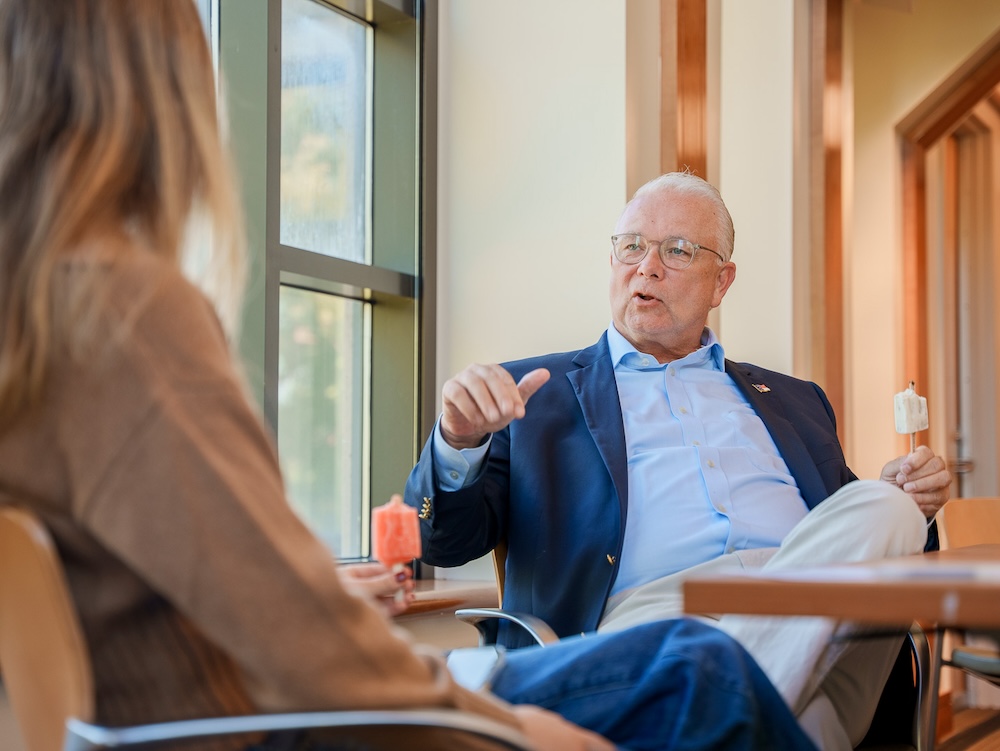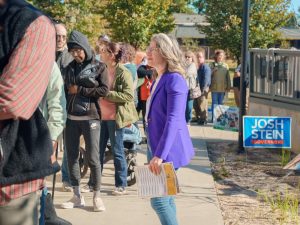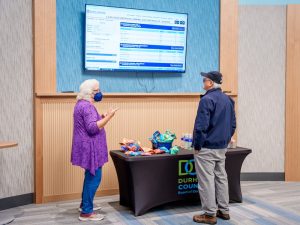This election season, The 9th Street Journal is sitting down with candidates to chat about their priorities — over frozen pops.
Our reporter Sophie Endrud spoke recently with Dave Boliek, a Republican who is running for state auditor. The interview has been lightly edited for length and clarity.

Sophie Endrud, The 9th Street Journal: Could you explain the Office of State Auditor for voters who might not be familiar, and why should they care about this election specifically?
Dave Boliek: The bread and butter of the state auditor’s office is to count the money, and to make sure that appropriations from the General Assembly are spent the way they were appropriated, and as part of that, to fight waste, fraud and abuse.
In addition to the accounting function, the state auditor’s office is charged with completing two other types of audits. One is something I refer to as an “economy and efficiency audit,” and another is something called a “program result audit.” In the economy and efficiency audit, the auditor goes in and takes a look at not just the finances of an agency or an institution or a program that receives state dollars, but at how efficient that particular office is and whether it’s actually producing results.
I think our current state auditor’s office could really do a much better job of doing some performance audits, asking, “What is the return on taxpayer investment? And that, to me, will give taxpayers across the state of North Carolina a really good view on exactly how their money is spent, and also give some guidance to policymakers on what programs we need to continue, what programs we need to increase funding for, and, quite frankly, what programs we may need to discontinue.
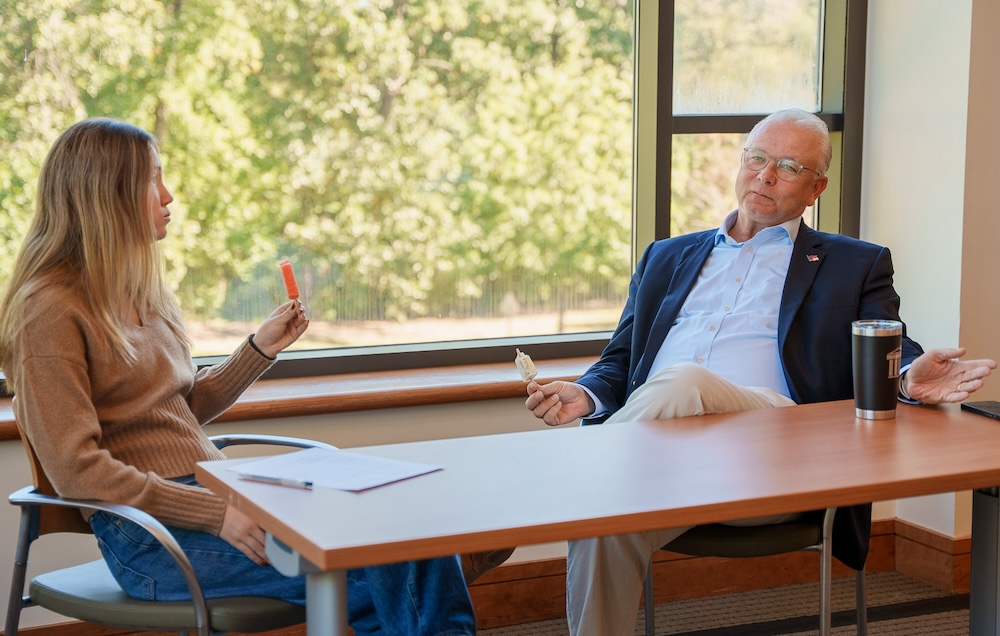
Dave Boliek: I’ve got a great life. I’m an attorney, got a master’s in business administration, got a wonderful wife who I’ve been married to for the last 30 years. We’ve got four great kids…But what really prompted me to run was my work as chairman of the board at UNC-Chapel Hill.
In that role, one of the first things that I took on was budget reform. When I arrived on campus, I was informed that there were 16 individual budgets running $4.4 billion a year in spending at the University of North Carolina in Chapel Hill…. so I took on a mission to reform the budget process.
We did that. We consolidated it to one all-funds budget, forward-looking, hired a chief financial officer to manage that budget and in the process, discovered a $100 million shortfall.
We were able to eliminate that budget shortfall in about 13 months.
That led me to the thought that maybe I could do a good job at the state level. And I was asked by folks, because of the leadership in that role, if I would be willing to run, and I considered it and decided to do it. I think my experience there, and my experience in business and my experience as a former prosecutor really fits with the Office of State Auditor.
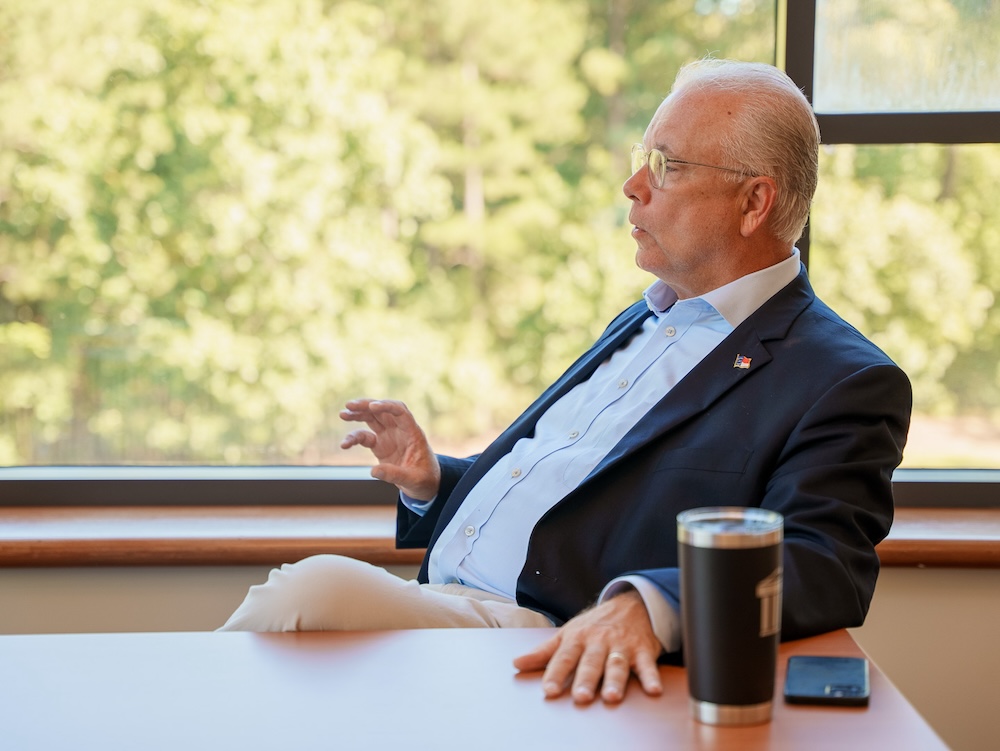
Dave Boliek: We’re going to start with a top-to-bottom economy and efficiency audit of the Department of Motor Vehicles. It is a complete train wreck in the state of North Carolina. The state legislature has appropriated tens of millions of dollars over the last several years to the Department of Motor Vehicles to make it more efficient. It has not worked and is starting now to cost North Carolina’s economy.
I talked to a very nice lady just a few weeks ago who was a stay-at-home mom, and she’s wanting to re-enter the workforce, and she needs her daughter to be able to get a driver’s license. Her 16-year-old cannot get her driver’s license until December of this year. So that’s preventing her from entering the workforce.
We’ve got to do better with things like the Department of Motor Vehicles. The state government has to be more customer service-oriented, and we have to be more efficient. The reason we’re going to start with the DMV is, it touches all taxpayers in North Carolina, and it will send a message to other state agencies and other state programs as to how my administration, if I’m elected, will work with and try to make these agencies and programs better.
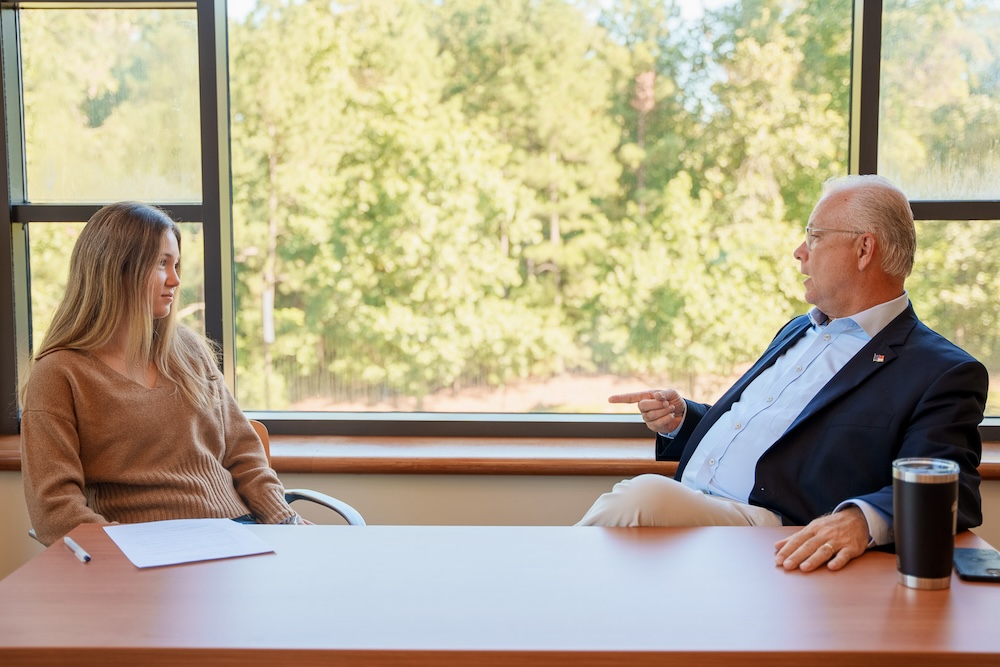
Dave Boliek: She’s just wrong. I’ve targeted the Department of Motor Vehicles because clearly, there’s a problem there. And anybody who can’t see a problem with lines that wrap around the DMV building — if you can’t see that as a problem, I’m sorry, you’re just not looking.
You know, the former elected state auditor, who’s a Democrat, who resigned her position after she got into traffic issues and some other stuff— when she ran, she had targeted Medicaid as a place where she wanted to audit, and not a single person criticized that Democrat for targeting Medicaid as a place to audit.
9th Street: As a UNC Board of Trustees member, you voted to cut funding for campus DEI efforts. Could you explain why?
Dave Boliek: I think DEI programs, number one, are an administrative waste of money. Over the last probably six to eight years, there has been an administrative apparatus created around this notion of DEI that, certainly at Chapel Hill ,was not giving the university community, students, faculty or the taxpayers a return on investment.
That is one of the big problems in higher education, in my opinion. No offense to people that have these jobs, but the administration in universities began increasing when federal student loans were backed by the federal government and universities could raise their tuition. And administrative apparatuses have been created across universities, and I have a philosophical view that the administration can be cut.
And DEI is a new phenomenon in universities. In Chapel Hill, it was not giving us any kind of return on investment, and that’s the primary reason why I felt like the DEI positions at Chapel Hill should be eliminated, and we could reapportion that money to things like public safety.
9th Street: How has your background in litigation influenced your understanding of this role?
Dave Boliek: I think it gives me confidence in going into an arena, whether it be an American Legion hall, where I’m speaking to voters, or whether it be — I spoke at a Trump rally in front of thousands of people. That litigation experience gives me confidence in being able to speak publicly, speak clearly, to explain myself to people that are interested in what I have to say about the state auditor’s office.
When you litigate a case, it’s like a project. You have a starting point and an endpoint. I think it helps me understand how to start something and get to the finish line and actually have a finished product.
9th Street: What’s one reason you would vote for and against your opponent?
Dave Boliek: She’s a Carolina grad. There’s a reason I would vote for her. Second, against, she does not have the experience that I have in life. There’s nothing wrong with being younger and being in office, don’t take that the wrong way.
But what I bring to the office is a different approach. I come out of private industry. I’ve worked for a short period of time in state government — other than being a prosecutor, I did work for the insurance commissioner’s office for a year and a half. I think it’s really important to have experience in the private world when you go into these offices, particularly at the level of Council of State, because there’s really a lot of authority and a lot of things that can be done with that office.
I also think that having the experience of managing people is really important, and I’ve had that experience. I’ve managed government contracts across the country when I first got out of law school, before I became a prosecutor. I’ve owned and run several businesses as well, so I’ve managed large teams, and I really think that experience is important for the office.
9th Street: What’s one example of an audit carried out by this office that you would hope to emulate?
Dave Boliek: I’ve got two, actually, one from each of the former elected state auditors that are currently living, who have also endorsed my candidacy. I’ll start with Beth Wood’s audit of the city of Rocky Mount. She was able to do a really thorough audit of the municipality of Rocky Mount, and uncovered quite a bit of discrepancies with respect to how money was being spent.
As part of that audit, for example, it was discovered that there was a city councilperson who had not paid a power bill for years. And that’s just not proper. That was a really good example of doing an audit and finding waste, fraud and abuse, and exposing that and helping voters and the public in the city of Rocky Mount to really make some change in that city government.
I would also point to an audit that Les Merritt did. Les Merritt was the state auditor prior to Beth Wood. He’s an elected Republican. He did a really good audit of the former Governor Mike Easley and his wife, who took a junket to France and Russia on state taxpayer dollars with no real government purpose and no return on investment, and that curtailed a lot of foreign travel without specific goals and needs for that travel moving forward. I’d like to be able to emulate that type of work as the state auditor.
9th Street: So you were registered as a Democrat until recently. To what extent do you believe that party affiliation would factor into your work as State Auditor?
Dave Boliek: Look, elections are partisan in North Carolina. My values, my ideology, my moral compass, align very clearly with the Republican Party and the platform of the Republican Party.
As the state auditor, and really in these Council of State positions that have authority, those types of jobs really require the person to be able to leave their party label at the door.
I’m not going to win 100% to zero. So I have to understand that my role is to work on behalf of every single taxpayer and understand that they may have a different ideological approach, but they’re important citizens, and their viewpoint is important. And that the dollars they spend are just as important as anybody else’s dollar.
If I go in and take an approach of just a party only, you lose integrity, so any audit you release doesn’t carry any weight. And if you lose integrity in the office, people stop listening to your audit results, and so you can’t be effective. That doesn’t mean I’m gonna leave my viewpoint or the fact that I’m a conservative at the door. I am who I am, right? But the party label has to stay at the door in order for the office to have any level of integrity.
9th Street: What’s one book you read recently, and what stands out to you about it?
Dave Boliek: “A Land Remembered,” a great book. It was about the settling of Florida, and what stood out to me about that particular book was how different this country was when it was young and there wasn’t a lot of development. It chronicled the way folks settled Florida.
I also just reread “1776” by McCullough, which is a great book. It chronicles the year 1776, focuses a lot on George Washington and what was going on during the revolution. And what was interesting about that book to me was how ordinary people stepped into interesting roles, like Henry Knox, that Fort Knox was named after. Knox was a book binder and became a general in the Revolutionary War. That was an interesting book, too.
Above: Dave Boliek, Republican candidate for state auditor, chats with reporter Sophie Endrud over Locopops. Photos by Kulsoom Rizavi — The 9th Street Journal
Sophie Endrud

